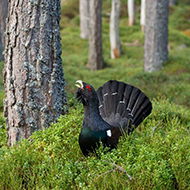
WildGenes experts hope to prevent the rare species from experiencing a genetic bottleneck.
WildGenes experts at the Royal Zoological Society of Scotland (RZSS) are working alongside the Cairngorms Capercaillie Project to help preserve the species.
The move comes after concerns that capercaillie birds are at risk of a genetic bottleneck, with almost all remaining capercaillies found only in Cairngorms National Park.
Commissioned to analyse capercaillie DNA samples, the WildGenes experts will be working to help secure a long-term future for the largest grouse species in the world by analysing the samples to inform critical conservation action.
RZSS WildGenes programme manager, Dr Alexander Ball, said of their project: “Understanding the genetic diversity of the UK’s capercaillie population is critical for its long-term survival and resilience to threats.
“Our research will determine whether the conservation focus for the species needs to be on expanding the gene pool rather than simply increasing numbers.
“We will be using a novel technique that will maximise our ability to work with the degraded DNA fragments found in feathers collected from the capercaillie’s current range in the Cairngorms National Park.”
The research is more vital than ever, as UK capercaillie numbers have fallen by over 90 per cent in the last 50 years, with Scotland's capercaillie population still decreasing in number. Alongside the threat of extinction, the capercaillies in the UK are at risk of experiencing a genetic bottleneck, as almost all remaining capercaillies live in Cairngorms National Park.
Project manager for the Cairngorms Capercaillie Project, Carolyn Robertson, said: “We’re incredibly excited to be working with the RZSS WildGenes laboratory. This method of analysis has never been used in capercaillie conservation before. It will significantly help the management of these birds in the UK, and it could also pave the way for future conservation projects across Eurasia.
“Collecting the DNA samples for this analysis was a large-scale operation in itself, with a small army of people responding to our project’s call for help. Foresters, rangers, stalkers, gamekeepers, ecologists and trained volunteers responded carefully gathering over 1,000 feathers to be sent to the lab.”
Alongside the efforts to conserve the current capercaillie population in Scotland, the genetic research project is also underway with sourcing historic DNA samples from Scottish birds to compare with present day ones. These samples are generally taken from the toe pads of preserved historic specimens, usually those for display.
The project has been in contact with private collection owners from across Scotland, but invites anyone who may own a capercaillie specimen to contribute to the research by contacting capercaillie@cairngorms.co.uk
Images (c) RZSS



 HMRC has invited feedback to its communications regarding the employment status of locum vets and vet nurses.
HMRC has invited feedback to its communications regarding the employment status of locum vets and vet nurses.